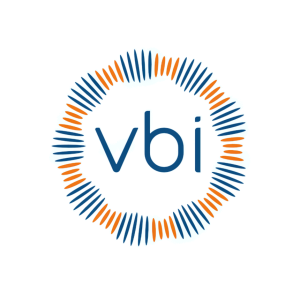VBI Vaccines Announces Phase 1b/2a Data and Progress of Hepatitis B Immunotherapeutic Candidate
VBI Vaccines Inc. (Nasdaq: VBIV) (VBI), a biopharmaceutical company driven by immunology in the pursuit of powerful prevention and treatment of disease, today announced data and next steps from the high-dose cohort of its Phase 1b/2a clinical study of VBI-2601 (BRII-179), the company’s hepatitis B immunotherapeutic candidate, in chronically-infected hepatitis B patients. VBI-2601 (BRII-179) is being developed in collaboration with Brii Biosciences (Brii Bio) as part of a potential functional cure for chronic hepatitis B virus (HBV) infection.
The Phase 1b/2a is a randomized, controlled study designed to assess the safety, tolerability, antiviral and immunologic activity of VBI-2601 (BRII-179) in 46 non-cirrhotic patients with chronic HBV infection on nucleos(t)ide analogue (NUC) therapy. The study is a two-part study to evaluate four doses of VBI-2601 (BRII-179), at either a low (20 µg) or high (40 µg) dose, with and without co-administration of interferon-alpha (IFN-α).
Data to-date from 33 evaluable patients across all study arms suggest:
- VBI-2601 (BRII-179) was well-tolerated at all dose levels with and without IFN-α, with no significant adverse events identified
-
Restimulation of T cell immune responses to HBV surface antigens, including S, Pre-S1, and Pre-S2, in ≥
50% (range:50% -78% ) of evaluable patients from all VBI-2601 (BRII-179) cohorts – compared to no detectable response in the control, NUC-only arm - The T cell responses and antibody responses were comparable across the 20µg and 40µg unadjuvanted study arms
- T cell response rates between the adjuvanted and unadjuvanted cohorts were also comparable
VBI and Brii are targeting the presentation of the complete Phase 1b/2a dataset at a scientific conference later in 2021.
Based on the acceptable safety profile and vaccine-induced adaptive immune responses observed to-date, the high dose of VBI-2601 (BRII-179), both with and without IFN-α, was selected to progress into a Phase 2 combination study of VBI-2601 (BRII-179) and BRII-835 (VIR-2218), a novel small interfering ribonucleic acid (siRNA) therapeutic candidate designed to inhibit expression of HBV proteins. Patient screening for the study initiated in March 2021 in New Zealand, and Brii Bio expects to initiate the study in China, Hong Kong, Australia, Taiwan, Singapore, Thailand, and South Korea in the second and third quarter of 2021.
About Hepatitis B
Hepatitis B is one of the world’s most significant infectious disease threats with more than 290 million people infected globally. HBV infection is the leading cause of liver disease and, with current treatments, it is very difficult to cure, with many patients going on to develop liver cancers. An estimated 900,000 people die each year from complications of chronic HBV such as liver decompensation, cirrhosis, and hepatocellular carcinoma.
About VBI-2601 (BRII-179)
VBI-2601 (BRII-179) is a novel recombinant, protein-based HBV immunotherapeutic candidate that builds upon the 3-antigen conformation of VBI’s prophylactic 3-antigen HBV vaccine candidate, and is designed to target enhanced B-cell and T-cell immunity. VBI-2601 (BRII-179) is being developed in collaboration with Brii Biosciences in the licensed territory of China, Hong Kong, Macau, and Taiwan as part of a potential functional cure for chronic hepatitis B infection.
About VBI Vaccines Inc.
VBI Vaccines Inc. (“VBI”) is a biopharmaceutical company driven by immunology in the pursuit of powerful prevention and treatment of disease. Through its innovative approach to virus-like particles (“VLPs”), including a proprietary enveloped VLP (“eVLP”) platform technology, VBI develops vaccine candidates that mimic the natural presentation of viruses, designed to elicit the innate power of the human immune system. VBI is committed to targeting and overcoming significant infectious diseases, including hepatitis B, coronaviruses, and cytomegalovirus (CMV), as well as aggressive cancers including glioblastoma (GBM). VBI is headquartered in Cambridge, Massachusetts, with research operations in Ottawa, Canada, and a research and manufacturing site in Rehovot, Israel.
Website Home: http://www.vbivaccines.com/
News and Resources: http://www.vbivaccines.com/news-and-resources/
Investors: http://www.vbivaccines.com/investors/
Cautionary Statement on Forward-looking Information
Certain statements in this press release that are forward-looking and not statements of historical fact are forward-looking statements within the meaning of the safe harbor provisions of the Private Securities Litigation Reform Act of 1995 and are forward-looking information within the meaning of Canadian securities laws (collectively, “forward-looking statements”). The Company cautions that such statements involve risks and uncertainties that may materially affect the Company’s results of operations. Such forward-looking statements are based on the beliefs of management as well as assumptions made by and information currently available to management. Actual results could differ materially from those contemplated by the forward-looking statements as a result of certain factors, including but not limited to, the impact of general economic, industry or political conditions in the United States or internationally; the impact of the ongoing COVID-19 pandemic on our clinical studies, manufacturing, business plan, and the global economy; the ability to establish that potential products are efficacious or safe in preclinical or clinical trials; the ability to establish or maintain collaborations on the development of therapeutic candidates; the ability to obtain appropriate or necessary governmental approvals to market potential products; the ability to obtain future funding for developmental products and working capital and to obtain such funding on commercially reasonable terms; the Company’s ability to manufacture product candidates on a commercial scale or in collaborations with third parties; changes in the size and nature of competitors; the ability to retain key executives and scientists; and the ability to secure and enforce legal rights related to the Company’s products. A discussion of these and other factors, including risks and uncertainties with respect to the Company, is set forth in the Company’s filings with the SEC and the Canadian securities authorities, including its Annual Report on Form 10-K filed with the SEC on March 2, 2021, and filed with the Canadian security authorities at sedar.com on March 2, 2021, as may be supplemented or amended by the Company’s Quarterly Reports on Form 10-Q. Given these risks, uncertainties and factors, you are cautioned not to place undue reliance on such forward-looking statements, which are qualified in their entirety by this cautionary statement. All such forward-looking statements made herein are based on our current expectations and we undertake no duty or obligation to update or revise any forward-looking statements for any reason, except as required by law.
View source version on businesswire.com: https://www.businesswire.com/news/home/20210412005138/en/







